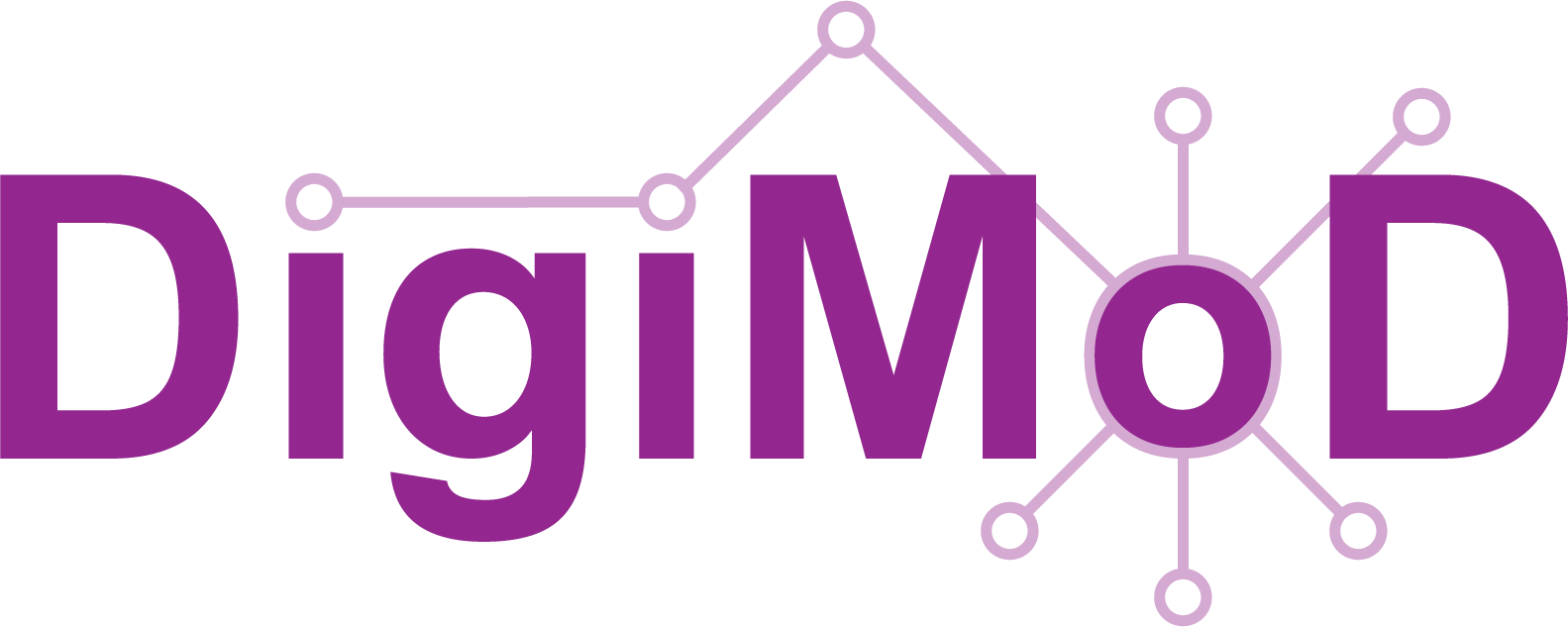See our latest Posts on
- Fellow Talk on Fringe Dynamics: Studying Anti-Democratic Movements at the Margins of Platform Ecosystems
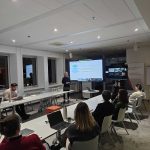 The year of 2025 began with an engaging fellow talk by Dr. Daniela Mahl on January 14th at the Weizenbaum Institute, where she presented her work on Fringe Dynamics: Studying Anti-Democratic Movements at the Margins of Platform Ecosystems. Her talk was inspired by the growing uncertainty surrounding the epistemic standards by which reality is approached […]
The year of 2025 began with an engaging fellow talk by Dr. Daniela Mahl on January 14th at the Weizenbaum Institute, where she presented her work on Fringe Dynamics: Studying Anti-Democratic Movements at the Margins of Platform Ecosystems. Her talk was inspired by the growing uncertainty surrounding the epistemic standards by which reality is approached […] - Workshop Conditions of Success for the Far-Right: A One-Day Exploration of Communication Strategies, Critique and Scholarly Insights
 In November 2024, Baoning Gong and Florian Primig (FU Berlin) organized the workshop Conditions of Success for the Far-Right: A One-Day Exploration of Communication Strategies, Critique, and Scholarly Insights. This event, part of the workshop series of the Far-Right Researchers (FFR) network, brought together scholars from the “Contemporary Research on Far-Right Politics” group at the […]
In November 2024, Baoning Gong and Florian Primig (FU Berlin) organized the workshop Conditions of Success for the Far-Right: A One-Day Exploration of Communication Strategies, Critique, and Scholarly Insights. This event, part of the workshop series of the Far-Right Researchers (FFR) network, brought together scholars from the “Contemporary Research on Far-Right Politics” group at the […] - Veiled conspiracism: Particularities and convergence in the styles and functions of conspiracy-related communication across digital platforms.
 At the beginning of this year, Dr. Kilian Buehling, Prof. Dr. Annett Heft, and Xixuan Zhang (all from the Weizenbaum Institute and Freie Universität Berlin) published their paper Veiled conspiracism: Particularities and convergence in the styles and functions of conspiracy-related communication across digital platforms in New Media & Society. Their research explores how digital communication […]
At the beginning of this year, Dr. Kilian Buehling, Prof. Dr. Annett Heft, and Xixuan Zhang (all from the Weizenbaum Institute and Freie Universität Berlin) published their paper Veiled conspiracism: Particularities and convergence in the styles and functions of conspiracy-related communication across digital platforms in New Media & Society. Their research explores how digital communication […] - Final Event of the NEOVEX Research Project
 On the 10th of December, our team members Annett Heft (Universität Tübingen, Freie Universität Berlin/Weizenbaum Institute), Kilian Buehling and Xixuan Zhang (both Freie Universität Berlin/Weizenbaum Institute) participated in the final event of the NEOVEX research project, which took place at the Representation of the State of Hamburg in Berlin. The event started with the presentation of the results […]
On the 10th of December, our team members Annett Heft (Universität Tübingen, Freie Universität Berlin/Weizenbaum Institute), Kilian Buehling and Xixuan Zhang (both Freie Universität Berlin/Weizenbaum Institute) participated in the final event of the NEOVEX research project, which took place at the Representation of the State of Hamburg in Berlin. The event started with the presentation of the results […] - Die Transnationalität rechtsextremer Verschwörungstheorien online und ihre länderspezifische Adaption
 Conspiracy theories have never been limited by geopolitical borders. In today’s digital age, advancements in technology have amplified interactions between individuals and groups worldwide, accelerating the spread of such ideas across nations. This work by Xixuan Zhang, Joana Becker, Dr. Annett Heft, and Dr. Kilian Buehling explores into methods for measuring the transnational dissemination of […]
Conspiracy theories have never been limited by geopolitical borders. In today’s digital age, advancements in technology have amplified interactions between individuals and groups worldwide, accelerating the spread of such ideas across nations. This work by Xixuan Zhang, Joana Becker, Dr. Annett Heft, and Dr. Kilian Buehling explores into methods for measuring the transnational dissemination of […] - The Transnationality of Far-Right Conspiracy Theories Online and Their Country-Specific Adaptation
 Conspiracy theories have never been confined by geopolitical borders. In the digital age, social media and online forums amplify their reach, allowing far-right ideologies to spread and adapt across different national and cultural contexts. A recent study conducted by Xixuan Zhang, Joana Becker, Dr. Annett Heft, and Dr. Kilian Buehling examines this phenomenon by analyzing the transnational dissemination […]
Conspiracy theories have never been confined by geopolitical borders. In the digital age, social media and online forums amplify their reach, allowing far-right ideologies to spread and adapt across different national and cultural contexts. A recent study conducted by Xixuan Zhang, Joana Becker, Dr. Annett Heft, and Dr. Kilian Buehling examines this phenomenon by analyzing the transnational dissemination […] - Visual Framing of Climate Denialism: Kilian Buehling at Collegium Helveticum Workshop
 From November 26th to November 27th, Kilian Buehling (Freie Universität/Weizenbaum Institute) participated in a workshop about “Visual Aspects of Political Communication and Digital Platforms” organized by the Collegium Helveticum. The workshop was designed to create a dynamic interdisciplinary forum, bringing together researchers from diverse fields to explore the evolving challenges and opportunities in the discipline. […]
From November 26th to November 27th, Kilian Buehling (Freie Universität/Weizenbaum Institute) participated in a workshop about “Visual Aspects of Political Communication and Digital Platforms” organized by the Collegium Helveticum. The workshop was designed to create a dynamic interdisciplinary forum, bringing together researchers from diverse fields to explore the evolving challenges and opportunities in the discipline. […] - AoIR 2024 conference and pre-conference satellite event at the University of Sheffield, UK
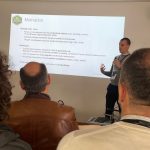 Two DigiMoD Team Members, Daniel Thiele (Freie Universität/Weizenbaum Institute) and Miriam Milzner (Freie Universität/Weizenbaum Institute), participated in a satellite event of the Association of Internet Researchers Conference (AoIR 2024) that took place at the University of Sheffield, UK. On October 29th, Daniel Thiele presented “Suspiciously similar. An embedding approach to capturing multimodal coordinated behavior,” co-authored with Miriam Milzner at […]
Two DigiMoD Team Members, Daniel Thiele (Freie Universität/Weizenbaum Institute) and Miriam Milzner (Freie Universität/Weizenbaum Institute), participated in a satellite event of the Association of Internet Researchers Conference (AoIR 2024) that took place at the University of Sheffield, UK. On October 29th, Daniel Thiele presented “Suspiciously similar. An embedding approach to capturing multimodal coordinated behavior,” co-authored with Miriam Milzner at […] - Workshop on Misinformation Research at the Weizenbaum Institute
 From November 7th to November 8th, the DigiMoD team participated in a workshop at the Weizenbaum Institute titled “Contextualizing Misinformation Research: Theoretical, Empirical, and Legal Frameworks” that was organized by Elizaveta Kuznetsova and Martha Stolze of the research group “Platform Algorithms and Digital Propaganda.” The recent workshop on mis- and disinformation in digital political communication […]
From November 7th to November 8th, the DigiMoD team participated in a workshop at the Weizenbaum Institute titled “Contextualizing Misinformation Research: Theoretical, Empirical, and Legal Frameworks” that was organized by Elizaveta Kuznetsova and Martha Stolze of the research group “Platform Algorithms and Digital Propaganda.” The recent workshop on mis- and disinformation in digital political communication […] - Workshop on Generative AI, Digital Publics, and Data Access at the Weizenbaum Institute
 From October 24th to October 25th, the DigiMoD team joined a workshop the Weizenbaum Institute hosted titled “Generative AI, Digital Publics, and Data Access: Advancing Collaborative Research”. This international workshop brought together researchers from the Digital Media Research Centre at Queensland Tech University and the Weizenbaum Institute. Through a combination of research presentations and breakout […]
From October 24th to October 25th, the DigiMoD team joined a workshop the Weizenbaum Institute hosted titled “Generative AI, Digital Publics, and Data Access: Advancing Collaborative Research”. This international workshop brought together researchers from the Digital Media Research Centre at Queensland Tech University and the Weizenbaum Institute. Through a combination of research presentations and breakout […] - Attention Is All They Need: An Analysis of the Use of Generative AI in Right-Wing Alternative Networks
 Rita Gsenger (Freie Universität and Weizenbaum Institute) and Dr. Annett Heft (Universität Tübingen, Freie Universität and Weizenbaum Institute) have contributed to the latest issue of Machine Against the Rage, published in Autumn 2024. The article, “Attention Is All They Need: Eine Analyse der Nutzung generative KI in rechtsalternativen Netzwerken,” is a part of the current issue, […]
Rita Gsenger (Freie Universität and Weizenbaum Institute) and Dr. Annett Heft (Universität Tübingen, Freie Universität and Weizenbaum Institute) have contributed to the latest issue of Machine Against the Rage, published in Autumn 2024. The article, “Attention Is All They Need: Eine Analyse der Nutzung generative KI in rechtsalternativen Netzwerken,” is a part of the current issue, […] - ECREA 2024 – 10th European Communication Conference at the University of Ljubljana, Slovenia
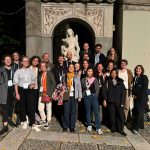 From September 24th until the 27th the DigiMoD-Team attended the 10th European Communication Conference (ECREA 2024) at the University of Ljubljana, Slovenia. Under the theme ‘Communication & social (dis)order’ the ECC 2024 conference invited the participants to rethink the state of communication in light of ongoing political, economic, environmental, health, and technological disruptions, reflecting on […]
From September 24th until the 27th the DigiMoD-Team attended the 10th European Communication Conference (ECREA 2024) at the University of Ljubljana, Slovenia. Under the theme ‘Communication & social (dis)order’ the ECC 2024 conference invited the participants to rethink the state of communication in light of ongoing political, economic, environmental, health, and technological disruptions, reflecting on […] - Right-Wing Election Campaigning on Telegram: “It Works Like a Media Outlet”
 In an interview with Leonie Dorn from the Weizenbaum Institute, Dr. Kilian Buehling and Baoning Gong (both Freie Universität/Weizenbaum Institute) explore how right-wing politicians used Telegram during state elections in East Germany to mobilize supporters. Their ongoing study combines quantitative and qualitative methods to understand how Telegram’s platform architecture enables extremist actors to manipulate their […]
In an interview with Leonie Dorn from the Weizenbaum Institute, Dr. Kilian Buehling and Baoning Gong (both Freie Universität/Weizenbaum Institute) explore how right-wing politicians used Telegram during state elections in East Germany to mobilize supporters. Their ongoing study combines quantitative and qualitative methods to understand how Telegram’s platform architecture enables extremist actors to manipulate their […] - European Violent Right-Wing Extremism Monitoring Project (EVREM)
 At the EU Internet Forum Technical Meeting on Terrorist and Violent Extremist Financing Activities Online II on September 10, 2024, Dr. Annett Heft (Freie Universität and Weizenbaum Institute) presented the European Violent Right-Wing Extremism Monitoring Project (EVREM) and shared key findings on funding trends in the far-right sector. The EU Internet Forum gathered EUIF members, […]
At the EU Internet Forum Technical Meeting on Terrorist and Violent Extremist Financing Activities Online II on September 10, 2024, Dr. Annett Heft (Freie Universität and Weizenbaum Institute) presented the European Violent Right-Wing Extremism Monitoring Project (EVREM) and shared key findings on funding trends in the far-right sector. The EU Internet Forum gathered EUIF members, […] - Studying Global Issues: Accommodating Context and Language Diversity when Employing Computational Text Analysis
 During her fellowship in the DigiMoD Research Group, Dr. Fabienne Lind gave an interesting talk at the Weizenbaum Institute. On September 10th, she spoke on “Studying Global Issues: Accommodating Context and Language Diversity when Employing Computational Text Analysis.” Addressing and mitigating global issues, such as migration movements or climate change, necessitates collaborative efforts that extend […]
During her fellowship in the DigiMoD Research Group, Dr. Fabienne Lind gave an interesting talk at the Weizenbaum Institute. On September 10th, she spoke on “Studying Global Issues: Accommodating Context and Language Diversity when Employing Computational Text Analysis.” Addressing and mitigating global issues, such as migration movements or climate change, necessitates collaborative efforts that extend […] - MISDOOM 2024 – Symposium at the University of Münster
 On the 3rd of September, our doctoral researcher, Miriam Milzner, participated in the 6th Multidisciplinary Symposium on Disinformation in Open Online Media (MISDOOM) held at the University of Münster, Germany. This event brought together an international community of disinformation researchers from diverse fields, including communication science, computer science, computational social science, political communication, and media […]
On the 3rd of September, our doctoral researcher, Miriam Milzner, participated in the 6th Multidisciplinary Symposium on Disinformation in Open Online Media (MISDOOM) held at the University of Münster, Germany. This event brought together an international community of disinformation researchers from diverse fields, including communication science, computer science, computational social science, political communication, and media […] - ECPR General Conference 2024 at University College Dublin
 From August 12th to 15th, we had an amazing chance to participate in the ECPR General Conference at University College Dublin! The event featured a comprehensive program of 24 panel sessions, covering the full spectrum of political science and offering dynamic platforms for discussion and debate. We had the opportunity to be the discussant at […]
From August 12th to 15th, we had an amazing chance to participate in the ECPR General Conference at University College Dublin! The event featured a comprehensive program of 24 panel sessions, covering the full spectrum of political science and offering dynamic platforms for discussion and debate. We had the opportunity to be the discussant at […] - 74th Annual ICA Conference “Communication and Global Human Rights”
 This year’s 74th Annual ICA Conference on “Communication and Global Human Rights” was held from June 20th to 24th in Gold Coast, Australia. This event focused on exploring the critical intersections between communication studies and human rights scholarship, showcasing current practices, research, and future directions. Topics ranged from the media’s role in advocating for marginalized […]
This year’s 74th Annual ICA Conference on “Communication and Global Human Rights” was held from June 20th to 24th in Gold Coast, Australia. This event focused on exploring the critical intersections between communication studies and human rights scholarship, showcasing current practices, research, and future directions. Topics ranged from the media’s role in advocating for marginalized […] - Discussions and exciting insights at the Centre for Deliberative Democracy and Global Governance (CDDGG), University of Canberra, Australia
 The Centre for Deliberative Democracy and Global Governance (CDDGG) at the University of Canberra, Australia, is a globally recognized leader in deliberative governance research, dedicated to exploring how inclusive and reflective communication can empower people in political decision-making. The center explores the impact of public deliberation in polarized and post-crisis contexts and advances theoretical debates […]
The Centre for Deliberative Democracy and Global Governance (CDDGG) at the University of Canberra, Australia, is a globally recognized leader in deliberative governance research, dedicated to exploring how inclusive and reflective communication can empower people in political decision-making. The center explores the impact of public deliberation in polarized and post-crisis contexts and advances theoretical debates […] - Podcast: Understanding Conspiracy Theories on Alternative Platforms
 In the latest episode of the NEOVEX podcast, Maik Fielitz from the Institute for Democracy and Civil Society in Jena, responsible for the area of right-wing extremism and democracy research at the IDZ, sits down with Dr. Kilian Bühling, a researcher at the Weizenbaum Institute for the Networked Society, working on the researching diffusion dynamics […]
In the latest episode of the NEOVEX podcast, Maik Fielitz from the Institute for Democracy and Civil Society in Jena, responsible for the area of right-wing extremism and democracy research at the IDZ, sits down with Dr. Kilian Bühling, a researcher at the Weizenbaum Institute for the Networked Society, working on the researching diffusion dynamics […] - New Edition of The Research Monitor (fyi 15): Right-Wing Movements and Their Threat to DemocracyThe Research Monitor (fyi 15) published on the 4th of June a new edition which compiles seven studies and an interview with Dr. Annett Heft. The publication entails the current state of research on right-wing movements, highlighting why they pose a serious threat to democracy and suggesting which efforts can be made to counteract them. […]
- Fellow Talk with our Research Fellow Dominik Schindler
 Visiting the research group in May Dominik Schindler, Ph.D. candidate in Applied Mathematics at Imperial College London, gave a talk on his latest research on May, 14. In his talk, titled “Bayesian Knowledge – Situated and Pluriversal Perspectives on Machine Learning”, he explored the fundamental mathematical structures of machine learning (ML) and challenged some of […]
Visiting the research group in May Dominik Schindler, Ph.D. candidate in Applied Mathematics at Imperial College London, gave a talk on his latest research on May, 14. In his talk, titled “Bayesian Knowledge – Situated and Pluriversal Perspectives on Machine Learning”, he explored the fundamental mathematical structures of machine learning (ML) and challenged some of […] - Varities of antigender politics: applying a contextual lens
 Despite their shared antigenderism, populist radical-right parties’ contestation of gender and sexual equality forms a continuum rather than being homogenous across countries. Susanne Reinhardt, Annett Heft, and Elena Pavan argue that varieties of antigenderism are best understood through a party’s societal context, ideology, and voter expectations. Read more into this subject by clicking here.
Despite their shared antigenderism, populist radical-right parties’ contestation of gender and sexual equality forms a continuum rather than being homogenous across countries. Susanne Reinhardt, Annett Heft, and Elena Pavan argue that varieties of antigenderism are best understood through a party’s societal context, ideology, and voter expectations. Read more into this subject by clicking here. - The new Steering Committee of the ECPR Standing Group on Political Communication
 We are happy to announce that our team member Daniel Thiele (Freie Universität Berlin/Weizenbaum Institute) was elected to the new Steering Committee of the ECPR Standing Group on Political Communication, announced on April 26th! The Standing Group on Political Communication encompasses research on the interactions among politics, media, and the public. This research network provides […]
We are happy to announce that our team member Daniel Thiele (Freie Universität Berlin/Weizenbaum Institute) was elected to the new Steering Committee of the ECPR Standing Group on Political Communication, announced on April 26th! The Standing Group on Political Communication encompasses research on the interactions among politics, media, and the public. This research network provides […] - Affording Conspiracism. Particularities of Conspiracy-Related Communication Across Platforms
 The international symposium “Indicators of Social Cohesion in Social Media and Online Media,” hosted by the Social Media Observatory (SMO) at the Leibniz-Institute for Media Research, took place from April 24 to 26, 2024. It explored the pivotal role of social and online media in uniting and dividing communities, from supporting democratic movements to fostering […]
The international symposium “Indicators of Social Cohesion in Social Media and Online Media,” hosted by the Social Media Observatory (SMO) at the Leibniz-Institute for Media Research, took place from April 24 to 26, 2024. It explored the pivotal role of social and online media in uniting and dividing communities, from supporting democratic movements to fostering […] - CLOUD-C: Climate, social media and transnational research workshop
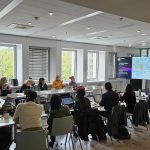 On April 18th and 19th, we hosted the workshop “CLOUD-C: Climate, Social Media, and Transnational Research” at the Weizenbaum Institute, Berlin, co-organized with the Helsinki Institute for Social Sciences and Humanities (HSSH). The Cloud-C Project is an international collaboration developed by the HSSH, focused on analyzing the discourse on climate politics in social media. This […]
On April 18th and 19th, we hosted the workshop “CLOUD-C: Climate, Social Media, and Transnational Research” at the Weizenbaum Institute, Berlin, co-organized with the Helsinki Institute for Social Sciences and Humanities (HSSH). The Cloud-C Project is an international collaboration developed by the HSSH, focused on analyzing the discourse on climate politics in social media. This […] - 2nd Place for the Best Paper Award by DGPuK
 We extend our congratulations to Annett Heft and Kilian Buehling (both Freie Universität Berlin/Weizenbaum Institute) along with their esteemed colleagues, Pablo Jost (Johannes Gutenberg-Universität Mainz), Maximilian Zehring, Hendrik Bitzmann, and Emese Domahidi (all Technische Universität Ilmenau), and Heidi Schulze (Ludwig-Maximilians-Universität Munich), for their notable achievement of receiving the 2nd place for the Best Journal Paper […]
We extend our congratulations to Annett Heft and Kilian Buehling (both Freie Universität Berlin/Weizenbaum Institute) along with their esteemed colleagues, Pablo Jost (Johannes Gutenberg-Universität Mainz), Maximilian Zehring, Hendrik Bitzmann, and Emese Domahidi (all Technische Universität Ilmenau), and Heidi Schulze (Ludwig-Maximilians-Universität Munich), for their notable achievement of receiving the 2nd place for the Best Journal Paper […] - Unveiling the Stylistic Dynamics of Conspiracy Theory Communication in Digital Spaces
 Today, the proliferation of conspiracy theories has become a prevalent issue, often fueled by the expansive reach of digital forums and social media platforms. A collaborative project led by Annett Heft, Kilian Buehling, Xixuan Zhang (all Freie University of Berlin/Weizenbaum Institute), research on the complex nuances of online communication surrounding conspiracy narratives. In their investigation, […]
Today, the proliferation of conspiracy theories has become a prevalent issue, often fueled by the expansive reach of digital forums and social media platforms. A collaborative project led by Annett Heft, Kilian Buehling, Xixuan Zhang (all Freie University of Berlin/Weizenbaum Institute), research on the complex nuances of online communication surrounding conspiracy narratives. In their investigation, […] - The Querdenken Telegram Dataset 2020 – 2022
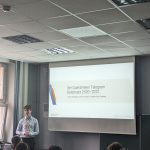 From March 13th to 15th the University of Erfurt hosted the 69. Annual Conference of the German Society for Journalism and Communication Studies (DGPuK). This year’s theme, “Visions for a Better Life,” aimed to stimulate a debate on the social relevance and future of communication science research. By exploring the roles that communication and media […]
From March 13th to 15th the University of Erfurt hosted the 69. Annual Conference of the German Society for Journalism and Communication Studies (DGPuK). This year’s theme, “Visions for a Better Life,” aimed to stimulate a debate on the social relevance and future of communication science research. By exploring the roles that communication and media […] - Der Ton macht die Musik – Die sprachlichen Finessen von Verschwörungserzählungen auf digitalen Plattformen
 Digital forums like 4chan and Reddit, along with social media platforms such as Twitter (now known as “X”), play a crucial role in the narration and spread of conspiracy theories. These platforms can serve as both a protected breeding ground for conspiracy theories, offering unmoderated, (semi-)public digital spaces to radicalized users, and as the primary […]
Digital forums like 4chan and Reddit, along with social media platforms such as Twitter (now known as “X”), play a crucial role in the narration and spread of conspiracy theories. These platforms can serve as both a protected breeding ground for conspiracy theories, offering unmoderated, (semi-)public digital spaces to radicalized users, and as the primary […] - Which factors shape citizen-generated populism? A computational analysis of comment sections during COVID-19 in seven European countries
 Citizen-generated populist content is flourishing in the comments sections of online news. The factors that shape the extent of such populist communication from below are still under-researched. The recent publication of Daniel Thiele (Freie Universität Berlin & Weizenbaum Institute, Berlin) focuses on the COVID-19 crisis to examine how contextual and media-related factors are related to […]
Citizen-generated populist content is flourishing in the comments sections of online news. The factors that shape the extent of such populist communication from below are still under-researched. The recent publication of Daniel Thiele (Freie Universität Berlin & Weizenbaum Institute, Berlin) focuses on the COVID-19 crisis to examine how contextual and media-related factors are related to […] - Telegram and its Affordances for Anti-Democratic MobilizationOn February 28, 2024 Dr. Olga Pasitselska at the University of Groningen hosted a guest lecture by Dr. Kilian Buehling from Freie Universität and Weizenbaum Institut, Berlin. The topic of the lecture was “Telegram and its Affordances for Anti-Democratic Mobilization” based on a paper he wrote together with Dr. Annet Heft. Dr. Kilian Buehling began […]
- Alliances and opportunity structures of gender contestations in GermanyFrom the 22nd until the 23rd February 2024, Annett Heft (Free University of Berlin/Weizenbaum Institute) had the great opportunity of presenting her work in the International Conference Polarization and Beyond. What Comes Next in Political Communication Research. The event was organized by the I-POLHYS: Investigating Polarization in Hybrid Media Systems and hosted by the University […]
- Right Topic, Right Source? Source Diversity and Balance in Right-Wing Alternative News Content Across TopicsOn February 11, 2024, the final version of the article titled “Right Topic, Right Source? Source Diversity and Balance in Right-Wing Alternative News Content Across Topics,” authored by Annett Heft (Freie University of Berlin/Weizenbaum Institute), Tim Ramsland, and Eva Mayerhöffer (both Roskilde University), was published by Taylor & Francis. The article investigates how right-wing alternative […]
- NEOVEX Meeting in Munich
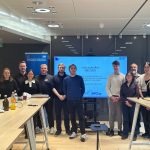 On February 7 and 8, the NEOVEX subprojects consortium meeting took place at the Munich School of Politics of the Technical University of Munich. The main focus was on exchanging ideas and planning future collaboration. During the one-day workshop, the subproject teams gathered to update the consortium and funding agencies on their current project work. […]
On February 7 and 8, the NEOVEX subprojects consortium meeting took place at the Munich School of Politics of the Technical University of Munich. The main focus was on exchanging ideas and planning future collaboration. During the one-day workshop, the subproject teams gathered to update the consortium and funding agencies on their current project work. […] - Presentation on ‘Mapping a Dark Space: Challenges in Sampling and Classifying Non- Institutionalized Actors on Telegram’
 On January 23, 2024, Prof. Dr. Pablo Jost (Ludwig-Maximilians-University of Munich) presented and discussed our collaborative work on Mapping a Dark Space: Challenges in Sampling and Classifying Non-Institutionalized Actors on Telegram, co-authored by Dr. Annett Heft and Dr. Kilian Buehling (both Freie Universität and Weizenbaum Institute), Maximilian Zehring and Emese Domahidi (both Ilmenau Technical University) as well as Heidi […]
On January 23, 2024, Prof. Dr. Pablo Jost (Ludwig-Maximilians-University of Munich) presented and discussed our collaborative work on Mapping a Dark Space: Challenges in Sampling and Classifying Non-Institutionalized Actors on Telegram, co-authored by Dr. Annett Heft and Dr. Kilian Buehling (both Freie Universität and Weizenbaum Institute), Maximilian Zehring and Emese Domahidi (both Ilmenau Technical University) as well as Heidi […] - Pandemic Protesters on Telegram: How Platform Affordances and Information Ecosystems Shape Digital CounterpublicsKilian Buehling and Annett Heft (both Freie University of Berlin/Weizenbaum Institute) published an article on the Pandemic Protesters on Telegram: How Platform Affordances and Information Ecosystems Shape Digital Counterpublics in Social Media + Society. Their research investigates the role of platform affordances, their adoption by movement actors, and the strategic use of information ecosystems in […]
- Cross-Border Journalism Content: Status Quo and PerspectivesJournalism has been crossing borders since news media and nation-states co-emerged in the seventeenth century. Still, the internet era has further advanced and expanded the border-transcending production, dissemination, and reception of news. The rise of cross-border journalism reflects the “increasing connectedness, boundarylessness, and mobility in the world” (Berglez, 2008, p. 855). The new “The Palgrave […]
- Vox Populi(st): Contexts and consequences of populism in user comments on news media Facebook pages
 On December 13, 2023, Daniel Thiele (Freie Universität Berlin & Weizenbaum Institute, Berlin) presented his research titled “Vox Populi(st): Contexts and Consequences of Populism in User Comments on News Media Facebook Pages” at the Helsinki Conference on Emotions, Populism and Polarization at the University of Helsinki. The conference was organized by the Helsinki Hub on […]
On December 13, 2023, Daniel Thiele (Freie Universität Berlin & Weizenbaum Institute, Berlin) presented his research titled “Vox Populi(st): Contexts and Consequences of Populism in User Comments on News Media Facebook Pages” at the Helsinki Conference on Emotions, Populism and Polarization at the University of Helsinki. The conference was organized by the Helsinki Hub on […] - Politicization and Right-Wing Normalization on Youtube: A Topic-Based Analysis of the “Alternative Influence Network”Curd Benjamin Knüpfer (Free University of Berlin), Carsten Schwemmer (Ludwig-Maximilians-University of Munich) and Annett Heft (Free University of Berlin/Weizenbaum Institute) published an article on the Politicization and Right-Wing Normalization on Youtube: A Topic-Based Analysis of the “Alternative Influence Network” in the International Journal of Communication. The study addresses a gap in current research on YouTube’s […]
- Light and Shadow of Participation and Mobilization in Networked Digital Public SpheresOn November 30th and December 1st, Annett Heft (Freie University of Berlin/Weizenbaum Institute) had the opportunity to participate in the conference „Zwischen Gefährdung & Emanzipation: Demokratie unter Druck“ (Between Threat and Emancipation: Democracy Under Pressure) hosted by the Institute for Democracy and Civil Society, together with the Amadeu Antonio Stiftung, Bundesministerium für Bildung und Forschung, […]
- Fellow Talk on Pandemic Activism with Prof. Dr. Shelly BoulianneWe were honored to have Prof. Dr. Shelly Boulianne, Professor of Digital Political Communication at the Université Catholique de Lille and currently a Research Fellow in our research group, giving a talk on her latest research on November, 28. In her talk “Pandemic activism in comparative perspective: Exploring the roles of digital media uses, misinformation, […]
- Twiplomacy and the War: Untangling networked practices of Russian diplomats during the full-scale invasion of UkraineFrom the 18th until the 21st of November Miriam Milzner (Freie University of Berlin/Weizenbaum Institute) had the great opportunity to participate in the three-day AoIR conference in Philadelphia, PA, USA. The 2023 AoIR conference explored the themes of revolutions, examining their inherent promises and failures in connection to digital technologies. It delved into the involvement […]
- Mapping a Dark Space: Challenges in Sampling and Classifying Non-Institutionalized Actors on TelegramNovember 14th a collaborative article Mapping a Dark Space: Challenges in Sampling and Classifying Non-Institutionalized Actors on Telegram with two members of our team was published in the journal Medien & Kommunikationswissenschaft! Written by Pablo Jost (Ludwig-Maximilians-University of Munich), Annett Heft (Free University of Berlin), Kilian Buehling (Free University of Berlin), Maximilian Zehring (Ilmenau Technical University), […]
- Book launch with Eviane Leidig “The Women of the Far Right”
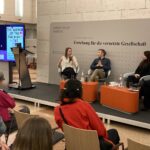 On November 2nd, 2023, we had the great pleasure of participating in the book launch of The Women of the Far Right, written by Dr. Eviane Leidig (Tilburg University). Hosted by the research project NEOVEX, the event was jointly organized with the Free University of Berlin, the Weizenbaum Institute for the Networked Society in Berlin, […]
On November 2nd, 2023, we had the great pleasure of participating in the book launch of The Women of the Far Right, written by Dr. Eviane Leidig (Tilburg University). Hosted by the research project NEOVEX, the event was jointly organized with the Free University of Berlin, the Weizenbaum Institute for the Networked Society in Berlin, […] - Alternative Platforms/Platform Alternatives: Comparisons and Transnational FlowsWe were happy to conduct the workshop titled “Alternative Platforms/Platform Alternatives: Comparisons and Transnational Flows” on October 20th and 21st at the Weizenbaum Institute in Berlin in collaboration with the Free University of Berlin! The workshop gathered approximately 20 international researchers, creating an intimate and relaxed atmosphere that fostered networking and great knowledge exchange. The […]
- International PhD Workshop in the University of BernFrom October 10th to 11th, the University of Bern hosted a great opportunity to dialogue ideas and insights on various doctoral research projects in a PhD Workshop! In a colloquium format, the event presented a valuable chance for professional exchange and network building. It united researchers from four universities who shared a common investigation expertise […]
- Theoretical Concepts and the Querdenken Mobilization on Telegram.On October 5th and 6th, Annett Heft (Freie University of Berlin/Weizenbaum Institute) participated in the Conference “Value Conflicts in a Differentiated Europe: the impact of digital media on value polarization in Europe (ValCon)” in Florence hosted by the research group Media and political communication. The conference addressed transnational and domestic dimensions of the independence of […]
- Hands-on workshop on data collection using the Telegram APIFrom September 27th to 29th, the 24th Conference of the Methods Section of the German Communication Association (DGPuK) was hosted by Babelsberg Film University in Potsdam. During the event, Kilian Buehling (Freie University of Berlin/Weizenbaum Institute) conducted a three-hour workshop on Digital Trace Data. The conference focused on the convergence of methodology and research ethics […]
- ECPR General Conference at Charles UniversityOn a five-day conference from the 4th until the 8th of September, we had an amazing chance to participate in the ECPR General Conference at Charles University! The event counted with an extensive program of about 60 sections covering the full breadth of political science and over 400 panels offering an engaging platform for discussion […]
- 2023 ECREA Political Communication Section ConferenceOn August 31st and September 1st, the Weizenbaum Institute and Free University of Berlin hosted the bi-annual ECREA Political Communication Section Conference! In an international environment, the event counted approximately 150 scholars from 23 countries in Europe, Australia, Asia, and America in Germany. The two-day conference was packed with exciting keynotes and insights into new […]
- Challenges of and approaches to data collection across platforms and time: Conspiracy-related digital traces as examples of political contention.In today’s digital landscape, the proliferation of online platforms and the rapid evolution of communication technologies present unique challenges for researchers. A recent study by Dr. Annett Heft, Dr. Kilian Buehling, Xixuan Zhang, Dominik Schindler, and Miriam Milzner (2023) investigates these complexities, focusing on the collection of conspiracy-related communication data across various digital platforms. Published […]
- How well can conspiracy theory content be measured on social media? It’s a matter of time!Many civil society and academic projects are engaged in documenting and analyzing conspiracy theory, anti-democratic or racist discourse on social media. Kilian Buehling has investigated to what extent the results of these efforts are influenced by the time of data collection. In this article, he summarizes the results of a recently published study. A bizarre […]
- NEOVEX Meeting in BerlinPeriodically, the researchers of the NEOVEX project meet in person to report on the progress of their subprojects. This time, the Weizenbaum Institute for the Networked Society in Berlin hosted the meeting on Thursday, September 22. In addition to members of the subprojects from IFSH Hamburg, TU Munich, FU Berlin and IDZ Jena, the VDI […]
- Platform infrastructures and the spread of conspiracy theoriesAfter the announcement in October 2022 that the microblogging platform Twitter had been acquired by Elon Musk, incidents both within the company and in the platform’s digital space began to spiral. Since then, many experts have been concerned that Twitter could become a communication platform where disinformation, hate speech, and conspiracy theories could take up a […]
- Jay Blumler Best Article Award 2022 for Annett Heft and Co-AuthorsAnnett Heft, head of the research group Digitalization and the Transnational Public Sphere at the Weizenbaum Institut for the Networked Society and the Free University Berlin, together with co-authors Curd Knüpfer, Susanne Reinhardt and Eva Mayerhöffer (Roskilde University), have been awarded The International Journal of Press/Politics Jay Blumler Best Article Award 2022 for their study […]
- Wie gut kann man verschwörungstheoretische Inhalte auf Social Media messen? Alles eine Frage der Zeit!
 Social media has become a central stage for conspiracy-theoretical, anti-democratic, and racist discourses. But how can such content be effectively documented and analyzed – and what role does the timing of data collection play in this process? Dr. Kilian Bühling has explored these questions in a recent study that highlights how dynamic and time-sensitive these […]
Social media has become a central stage for conspiracy-theoretical, anti-democratic, and racist discourses. But how can such content be effectively documented and analyzed – and what role does the timing of data collection play in this process? Dr. Kilian Bühling has explored these questions in a recent study that highlights how dynamic and time-sensitive these […] - Kick-Off Meeting and Fellow Visit Nicola RighettiExciting news! We’ve officially launched our new research group, “Dynamics of Digital Mobilization” with two kick-off meetings on January 19th and February 16th, 2023. Our research program will focus on analyzing the impact of digital connectivity on politics and society, both within and between European democracies, as well as in other international societies. Our goal […]
- Plattforminfrastrukturen und die Verbreitung von Verschwörungstheorien
 Elon Musk’s acquisition of Twitter could dramatically reshape the platform’s structures, potentially paving the way for more disinformation, hate speech, and conspiracy theories. In this analysis, Dr. Annett Heft examines how the design and features of social media platforms influence their usage and the dynamics of discourse. She delves into the potential impacts of this […]
Elon Musk’s acquisition of Twitter could dramatically reshape the platform’s structures, potentially paving the way for more disinformation, hate speech, and conspiracy theories. In this analysis, Dr. Annett Heft examines how the design and features of social media platforms influence their usage and the dynamics of discourse. She delves into the potential impacts of this […] - Mobilization and support structures in radical right party networksWhether a radical right party is in opposition or in government significantly influences the digital communication of its actors and supporters. This is a central finding of the latest publication “Mobilization and support structures in radical right party networks. Digital political communication ecologies in the 2019 European parliament elections” by Annett Heft, Susanne Reinhardt and […]
- NEOVEX-Verbundtreffen in Berlin
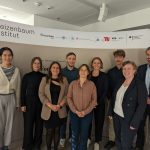 The researchers involved in the NEOVEX collaborative project meet regularly to report on the progress of their individual subprojects. This time, the meeting took place on Thursday, September 22, at the Weizenbaum Institute for the Networked Society in Berlin. Read on for insights into their latest developments and achievements. The following text has been originally […]
The researchers involved in the NEOVEX collaborative project meet regularly to report on the progress of their individual subprojects. This time, the meeting took place on Thursday, September 22, at the Weizenbaum Institute for the Networked Society in Berlin. Read on for insights into their latest developments and achievements. The following text has been originally […] - NEOVEX-Verbundtreffen in Berlin
 The researchers involved in the NEOVEX collaborative project meet regularly to report on the progress of their individual subprojects. This time, the meeting took place on Thursday, September 22, at the Weizenbaum Institute for the Networked Society in Berlin. Read on for insights into their latest developments and achievements The following text has been originally […]
The researchers involved in the NEOVEX collaborative project meet regularly to report on the progress of their individual subprojects. This time, the meeting took place on Thursday, September 22, at the Weizenbaum Institute for the Networked Society in Berlin. Read on for insights into their latest developments and achievements The following text has been originally […] - Wie wird die Verbreitung von Verschwörungstheorien gemessen?
 Conspiracy theories are only as popular as their ability to spread. But how can we gain reliable insights into their reach? In this post, Dr. Annett Heft and Dr. Kilian Bühling explore the methods used to measure the dissemination of conspiracy theories. The following text has been originally published in German on the NEOVEX website. Verschwörungstheorien sind […]
Conspiracy theories are only as popular as their ability to spread. But how can we gain reliable insights into their reach? In this post, Dr. Annett Heft and Dr. Kilian Bühling explore the methods used to measure the dissemination of conspiracy theories. The following text has been originally published in German on the NEOVEX website. Verschwörungstheorien sind […]
